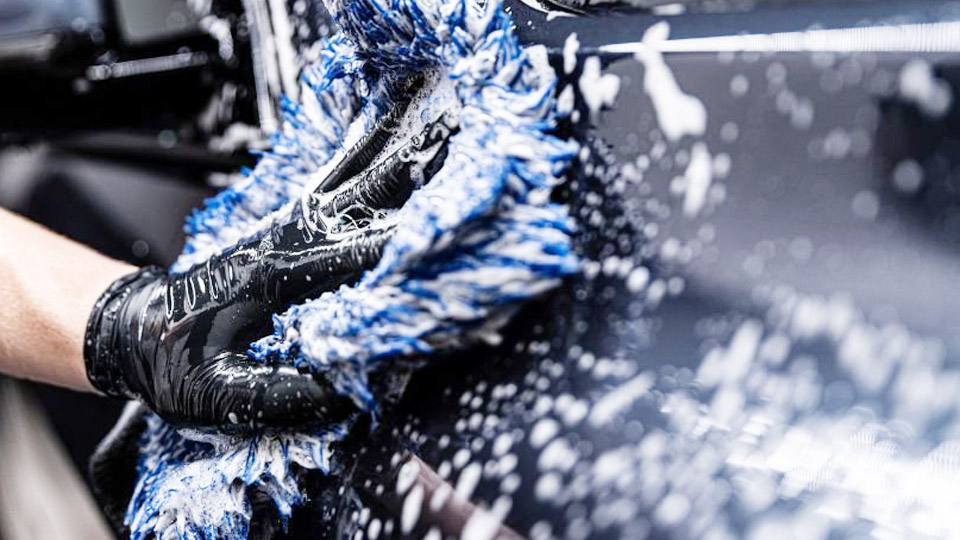What Do I Need to Open a Hand Car Wash?
I’ve always loved the sparkle of a freshly cleaned car, and a few years ago, that passion pushed me to open my own hand car wash in a small town in the USA. It was a dream come true, but let me tell you, it took a lot of planning, hard work, and learning to get it right.
If you’re wondering, “What do I need to open a hand car wash?” you’re in the right place. From permits to equipment, I’ve been through it all—spending long nights researching regulations and scrubbing cars myself to test supplies.
A hand car wash is a business where workers clean vehicles by hand, offering a personal touch that machines can’t match. I’m here to share everything I learned, step by step, so you can start your own car wash with confidence. Let’s dive into what you need to make your dream shine!

Image by ownersprideoma
Why Open a Hand Car Wash?
| # | Preview | Product | |
|---|---|---|---|
| 1 |

|
Glass Slippers | Check Price on Amazon |
| 2 |

|
Mend My Heart | Check Price on Amazon |
| 3 |

|
Beautiful | Check Price on Amazon |
| 4 |

|
Beautiful in the Style of Christina Aguilera | Check Price on Amazon |
Starting a hand car wash is exciting. I chose it because people always need clean cars, especially in busy areas. It’s a simple business with low startup costs compared to other ventures. I spent about $20,000 to get mine going, but you can start smaller. Customers love the care of a hand wash—my regulars say it beats automated machines.
You can offer extras like waxing or interior cleaning to boost profits. I’ve seen my shop thrive in a car-loving state like California, but it works anywhere folks value their vehicles. If you’re hardworking and love making things shine, it’s a great fit.
Hand Car Wash Business
A hand car wash is different from automated ones. Workers use buckets, sponges, and hoses to scrub cars by hand. I started with a basic setup—two wash bays and three employees. You can operate from a fixed location, like a lot, or go mobile, washing cars at customers’ homes.
I chose a fixed spot for steady foot traffic. It’s labor-intensive but gives a personal touch. Customers trust us to avoid scratches that machines might cause. Knowing the business helps you plan what you need, from space to supplies.
Key Requirements to Open a Hand Car Wash
Opening my car wash taught me there’s a lot to prepare. Here’s what I needed, broken down so you can follow along.
Business Plan
I started with a business plan, and it was my roadmap. I wrote down my goals, budget, and target customers. My plan estimated $15,000 for startup costs and projected $5,000 monthly revenue. I researched local competitors—there were three car washes nearby, but none offered hand detailing. This helped me stand out.
I included marketing ideas, like flyers and social media ads. A plan doesn’t have to be fancy—mine was 10 pages—but it kept me focused. It also impressed my bank when I needed a loan. Spend a weekend drafting yours; it’s worth it.
Location
Finding the right spot was crucial. I leased a small lot near a busy intersection for $2,000/month. High-traffic areas, like near malls or gas stations, bring customers. I made sure my lot had enough space for two cars to wash and a waiting area.
You need water access and drainage—my lot had both, but I added a drain for $1,500. If you go mobile, you don’t need a fixed spot, but you’ll need a van and portable gear. I considered mobile but wanted a steady base. Check zoning laws—my town required a commercial zone for car washes.
Permits and Licenses
Permits were a headache, but necessary. I needed a business license from my city, costing $100. Since car washes use water, I got a wastewater discharge permit from the local environmental agency for $200. Some states, like California, have strict water rules—I installed a reclamation system to comply.
I also needed a sales tax permit (free) to collect tax on services. Check with your county clerk for local rules—my town required a signage permit ($50) for my shop’s sign. I spent $400 total on permits. Get these early to avoid fines.
Equipment and Supplies
I had to buy equipment to get washing. My setup included:
- High-pressure hoses ($200 each, bought two)
- Buckets and sponges ($50 for 10 sets)
- Car wash soap ($100 for a 5-gallon drum)
- Microfiber towels ($100 for 50)
- Wax and polish ($150 for bulk)
- Vacuum cleaners ($300 for two)
- Water reclamation system ($3,000, required by my city)
- Signs and banners ($200)
I spent $4,200 on equipment. I started small, buying more towels as business grew. For mobile washes, add a water tank ($500) and generator ($400). I tested soaps to find one that didn’t streak—quality matters. Shop at wholesale suppliers like AutoZone to save.
Water and Drainage Systems
Water is the heart of a car wash. I needed a reliable water hookup, which my lot had, costing $100/month. Drainage was trickier—my city required a system to catch runoff and filter soap. I spent $3,000 on a reclamation system that recycles water, saving on bills and meeting regulations.
Mobile washes need portable tanks—my friend’s mobile setup uses a 100-gallon tank. Check local water laws; some areas limit usage. I learned this when my first site was rejected for poor drainage. Proper systems keep you legal and eco-friendly.
Insurance
I didn’t skimp on insurance—it protects your business. I got general liability insurance for $800/year, covering accidents like a customer slipping. Workers’ compensation ($1,200/year) was required since I had employees. I also got property insurance ($500/year) for equipment damage.
Total cost was $2,500/year. Mobile washes need vehicle insurance, too—about $1,000/year. I shopped quotes from State Farm and Progressive to save. Insurance seems pricey, but it saved me when a worker broke a customer’s mirror. Get it before you open.
Employees
I started with three part-time workers, paying $12/hour each. Hand car washes need people to scrub, dry, and detail. I trained them myself, showing how to avoid scratches and use wax. Hiring was tough—I posted on Indeed and found good folks. You need reliable workers who care about quality.
I spent $1,500/month on wages at first. If you’re solo, you save money but limit jobs. I tried that and burned out fast. In Florida, you need a worker’s comp policy for employees—check your state’s rules. Happy workers keep customers coming back.
Marketing and Branding
Getting customers was my next hurdle. I spent $500 on marketing to start. I made flyers ($100) and handed them out at gas stations. A sign outside my shop ($200) caught drivers’ eyes. I set up a Facebook page (free) and posted before-and-after photos—got 50 likes in a week.
I offered a $5 discount for first-time customers, which brought in 20 cars opening week. Later, I spent $200 on Google Ads, targeting “car wash near me.” Word-of-mouth grew as I focused on quality. I learned branding matters—my logo, a shiny blue car, made us memorable.
Startup Budget
Here’s a table of my startup costs, so you can plan yours:
| Item | Cost | Notes |
|---|---|---|
| Business License/Permits | $400 | Varies by city; includes wastewater permit. |
| Location Lease | $2,000/month | High-traffic lot; mobile skips this. |
| Equipment/Supplies | $4,200 | Hoses, soap, towels, reclamation system. |
| Water Reclamation System | $3,000 | Required in many areas; saves water. |
| Insurance | $2,500/year | Liability, workers’ comp, property. |
| Employee Wages | $1,500/month | Three part-timers at $12/hour to start. |
| Marketing | $500 | Flyers, signs, social media ads. |
| Miscellaneous | $1,000 | Unexpected costs, like extra soap or repairs. |
My total startup was $13,600, plus ongoing costs like rent and wages. You can start for $5,000-$10,000 with a mobile setup.
Choosing Between Fixed and Mobile Car Wash
I went with a fixed location, but mobile car washes are popular, too. Fixed spots need a lot and permits but get steady traffic. I chose this for visibility—my shop’s near a Walmart, so cars roll in. Mobile washes need a van, water tank, and generator, costing $5,000-$8,000 to start.
You go to customers, saving on rent but spending on gas. My friend runs a mobile wash and loves the flexibility. I stuck with fixed because I wanted a community hub. Decide based on your budget and lifestyle—both can work.
Finding the Right Location
Location is make-or-break. I scouted 10 spots before picking mine. Look for busy roads with easy access—my lot’s near a stoplight, so drivers see us. You need space for washing, drying, and customer parking. My 1,000-square-foot lot fits two cars and a waiting area.
Check water and drainage—my first choice lacked a drain, costing me $2,000 to fix. Zoning laws matter; my city banned car washes in residential areas. I paid $2,000/month for a prime spot, but smaller towns might be $1,000. Mobile washes skip this but need storage for gear.
Navigating Permits and Regulations
Permits took time but kept me legal. I got a business license from my city hall for $100. The wastewater permit was $200—car wash runoff can’t go into storm drains. I needed a reclamation system to filter soap, per local rules. A sales tax permit (free) let me collect tax.
My shop’s sign needed a $50 permit. Total permit costs were $400, but they vary by state. California and New York have stricter water rules than Texas. I checked with my county’s environmental office to avoid surprises. Get permits early—fines hurt.
Selecting Quality Equipment and Supplies
Equipment makes or breaks your wash. I started with two pressure hoses ($400), 10 buckets ($50), and car-safe soap ($100). Microfiber towels ($100) prevent scratches—cheap ones leave marks. I bought wax ($150) for extra services, boosting profits. My vacuums ($300) handle interiors.
The $3,000 reclamation system was my biggest expense but saved water and met laws. I tested soaps to find a streak-free one—customers notice. For mobile washes, add a 100-gallon water tank ($500). I shopped at wholesale stores like Costco to save. Quality gear lasts longer and keeps cars spotless.
Hiring and Training Employees
I couldn’t do it alone, so I hired three part-timers. I paid $12/hour, totaling $1,500/month. Finding good workers was tough—I used Indeed and interviewed 10 people. I trained them to scrub gently, dry thoroughly, and smile at customers.
Training took a week, but it paid off—my team’s care brought regulars. I needed workers’ comp insurance ($1,200/year) for employees. If you start solo, you save but limit jobs. I tried solo and got overwhelmed. Happy workers are key—my team’s friendliness doubled tips.
Marketing Your Car Wash
I had to spread the word to get customers. I spent $500 to start. Flyers ($100) at local stores brought in 15 cars first week. My shop’s sign ($200) was bright and bold. I made a free Instagram page, posting shiny cars—got 100 followers fast. A $5-off coupon drew crowds.
Later, I spent $200 on Google Ads, targeting “hand car wash near me.” I offered loyalty cards—10 washes, one free—which kept folks coming back. My best marketing was quality—clean cars turned customers into promoters.
Managing Finances
Money matters, and I learned fast. My startup cost was $13,600, with $3,500/month ongoing (rent, wages, supplies). I charged $15 for a basic wash, $30 with wax, earning $4,000/month at first. I used QuickBooks to track expenses—saved me at tax time.
I got a $10,000 small business loan from my bank, repaid over three years. I kept $1,000 for surprises, like a broken hose. Profit came after six months, but I reinvested in better soap. Budget tight and track every dollar—it’s your lifeline.
Eco-Friendly Practices
I wanted to be green, so I focused on sustainability. My reclamation system ($3,000) recycled 80% of water, cutting bills and meeting laws. I used biodegradable soap ($120/drum) to protect drains. I recycled cardboard and plastic at my shop—free drop-off nearby. For mobile washes, solar-powered generators ($500) save fuel.
Customers love eco-friendly businesses—my green focus brought in eco-conscious drivers. I learned water rules vary—California’s stricter than Florida—so check local laws. Going green costs a bit but builds loyalty.
Common Challenges and Solutions
I hit some snags, but here’s how I handled them:
- Permit Delays: Approvals took weeks. I started paperwork early to avoid delays.
- Slow Start: First month was quiet. I offered discounts to build a customer base.
- Employee Turnover: Workers quit. I raised pay to $13/hour and gave bonuses.
- Equipment Breaks: A hose burst. I kept spare parts to fix fast.
- Water Regulations: Rules were strict. I installed a reclamation system to comply.
These taught me patience and planning—you’ll face hurdles but can overcome them.
Scaling Your Business
Once my shop was steady, I thought bigger. I added interior detailing for $50, doubling some tickets. I’m saving for a second location in a nearby town. Mobile units are another option—my friend added one for $6,000 and serves offices.
I hired a manager ($15/hour) to free my time. You can franchise or offer subscriptions, like $50/month for weekly washes—my neighbor’s shop does this and thrives. Scaling takes money but grows profits. I started small and grew as I learned.
Building a Loyal Customer Base
Customers are your business’s heart. I focused on quality—clean cars, friendly service. I greeted every customer by name, and they loved it. Loyalty cards (10 washes, one free) kept folks returning. I offered free touch-ups if anyone wasn’t happy—used twice but built trust.
Social media helped—I posted videos of shiny cars, getting 200 likes. I gave discounts to regulars, like $2 off for teachers. Happy customers told friends, and my shop grew by word-of-mouth. Treat people right, and they’ll keep coming back.
Conclusion
Opening a hand car wash is a journey that’s both challenging and rewarding. I went from dreaming in my garage to running a thriving business, and I’ve loved every minute. From finding a location to buying soap, it took about $13,600 and a lot of hustle to start.
But seeing cars gleam and customers smile makes it worth every penny. If you go fixed or mobile, focus on quality, plan your budget, and follow local rules. You’re not just washing cars—you’re building a business that shines as bright as your customers’ rides.
FAQs
How much does it cost to open a hand car wash?
It depends, but I spent $13,600. You can start for $5,000-$10,000 with a mobile setup.
Do I need permits to open a car wash?
Yes, like business and wastewater permits. I paid $400 total, but costs vary by city.
Can I start a car wash without employees?
Sure, but it’s tough. I tried solo and got swamped—hiring helped me grow.
Is a mobile car wash cheaper to start?
Yes, about $5,000-$8,000. I chose a fixed spot for traffic but mobile saves on rent.
How do I get customers for my car wash?
Flyers, signs, and social media worked for me. I spent $500 on marketing and offered discounts.
Are there water regulations for car washes?
Yes, especially in dry states. I spent $3,000 on a reclamation system to meet rules.

David Peterson, the chief editor of sparepartscare. I am an automobile engineer and assign to an local firm with much experience in automobile equipment. During the time, most of my experience is related to the Industry of cars parts. I learned about the thing, when working with experienced inspectors, one must be as good as the inspector, or better, with knowledge of the project as well as the practical aspects of automobile industry.








